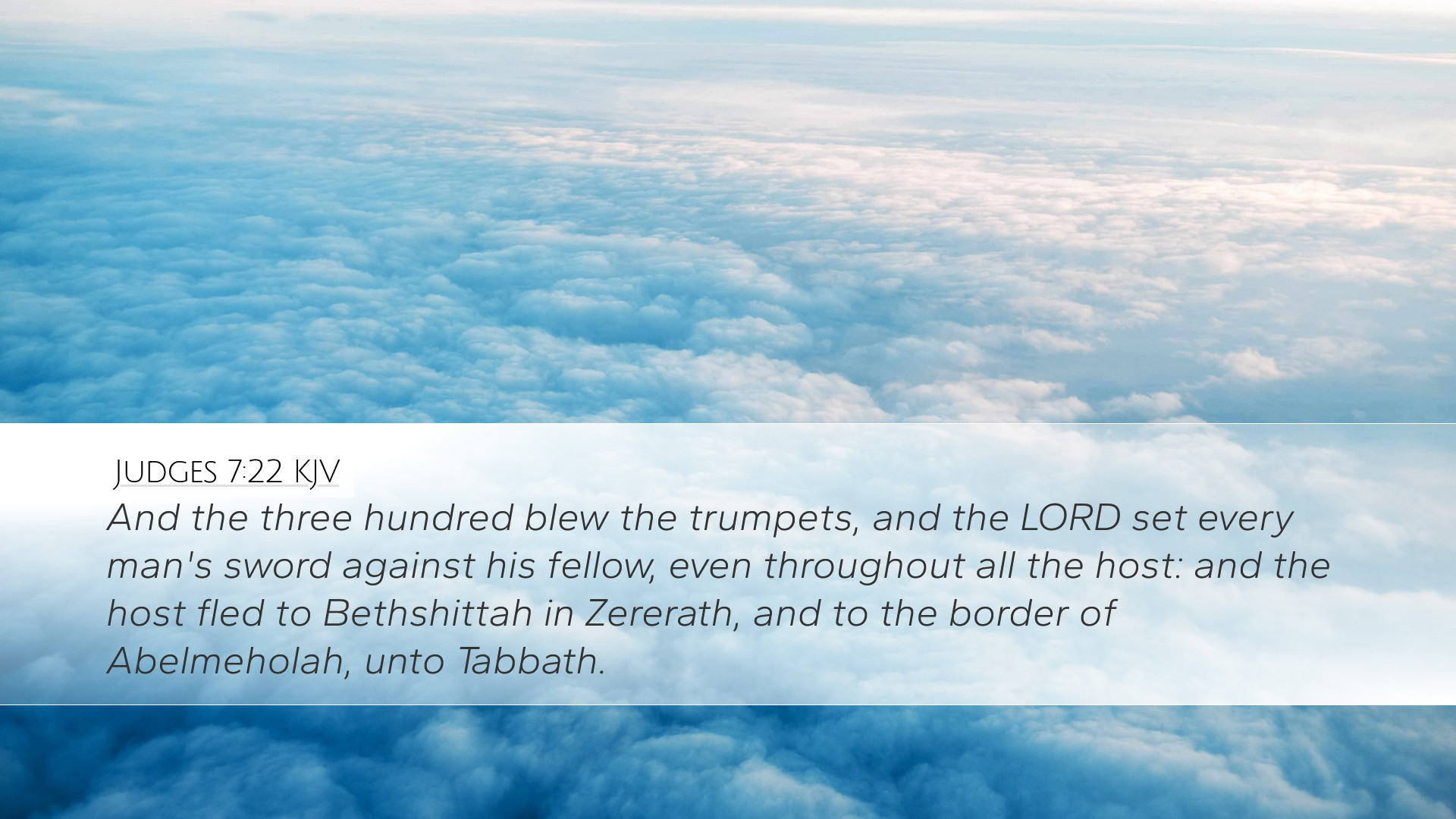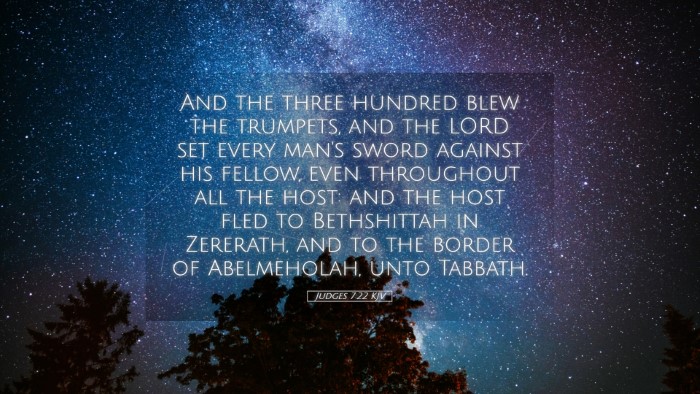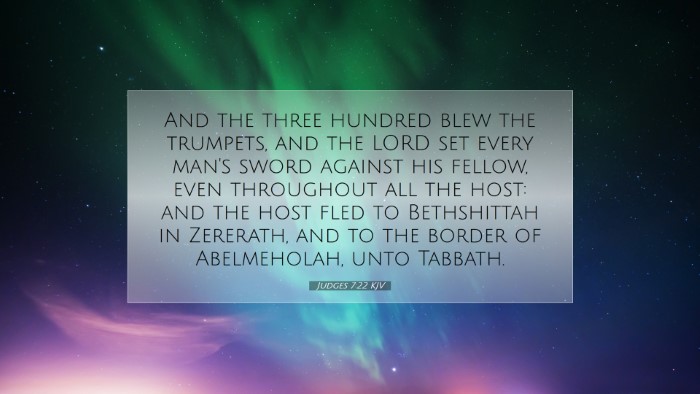Old Testament
Genesis Exodus Leviticus Numbers Deuteronomy Joshua Judges Ruth 1 Samuel 2 Samuel 1 Kings 2 Kings 1 Chronicles 2 Chronicles Ezra Nehemiah Esther Job Psalms Proverbs Ecclesiastes Song of Solomon Isaiah Jeremiah Lamentations Ezekiel Daniel Hosea Joel Amos Obadiah Jonah Micah Nahum Habakkuk Zephaniah Haggai Zechariah MalachiJudges 7:22
Judges 7:22 KJV
And the three hundred blew the trumpets, and the LORD set every man's sword against his fellow, even throughout all the host: and the host fled to Bethshittah in Zererath, and to the border of Abelmeholah, unto Tabbath.
Judges 7:22 Bible Commentary
Bible Commentary on Judges 7:22
Judges 7:22 reads: “When they blew the three hundred trumpets, the Lord set every man's sword against his companion throughout the whole camp; and the army fled to Beth Acacia, toward Zererath, as far as the border of Abel Meholah, by Tabath.” This verse occurs in the pivotal moment of Gideon’s victory over the Midianites, illustrating the powerful intervention of God in warfare and the spiritual principles of divine assistance.
Contextual Background
The narrative of Gideon’s conquest (Judges 6-7) is set against the backdrop of Israel’s cycles of apostasy and oppression. After suffering under Midian for seven years due to their disobedience, God raises Gideon as a deliverer. God's unconventional choice to use only 300 men, against an army of tens of thousands, underscores the theme of reliance on divine rather than human strength.
Analysis of Judges 7:22
1. The Role of Trumpets
The sounding of trumpets has significant implications. Matthew Henry indicates that trumpets were instruments of both alarm and celebration, accentuating the divine action. Here, the trumpets serve as a rallying call for the Israelite forces and a signal for God to unleash chaos among the Midianites.
2. Divine Confusion
Albert Barnes points out that the confusion in the Midianite camp signifies God’s direct intervention. The phrase “the Lord set every man’s sword against his companion” (Judges 7:22) emphasizes not only the element of divine causation but also the supernatural confusion that God can induce among an adversary. This serves as a reminder that God is the ultimate commander in the spiritual battles faced by His people.
3. The Significance of Each Fleeing Direction
The directions in which the Midianites fled—toward various locations—hold both geographical and symbolic relevance. Adam Clarke interprets this as a representation of the disarray that can result when God fights for His people. The retreat illustrates not just physical flight but also spiritual defeat, showcasing the power of God to dismantle the plans of the wicked.
Theological Implications
1. Sovereignty of God
This passage beautifully reflects the sovereignty of God, who orchestrates events in sovereign authority over nations and armies. As affirmed in Psalms 33:10-11, God’s counsel can stand firm while human plans often falter. The success of Gideon’s 300 men serves as a testimony to God’s power in seeming weakness.
2. Faith and Obedience
Gideon's success calls to mind the importance of faith and obedience. The troops’ boldness in following Gideon’s unorthodox strategy echoes Hebrews 11:32-34, where Gideon is honored as a model of faith. The significant lesson for pastors and leaders today is to remain sensitive to God's directives, even when they differ from conventional wisdom.
3. Spiritual Warfare
The chaos inflicted on the Midianite camp serves as a metaphor for the spiritual warfare that believers encounter. Paul talks about our struggle not being against flesh and blood but against principalities and powers (Ephesians 6:12). This passage emphasizes reliance on God’s power rather than our strategic acumen alone.
Practical Applications
- Trust in God’s Methods: Just as Gideon relied on what might have seemed foolish to the world, believers should trust in God’s methods for victory.
- Gathering Community: The sounding of trumpets indicates the importance of community and shared purpose in spiritual endeavors.
- Divine Intervention: Foster an awareness of God’s intervention in life's battles, cultivating hope in disheartening situations.
Conclusion
Judges 7:22 encapsulates a moment where God’s mighty hand secured a remarkable victory through unlikely means. This serves to remind pastors, students, theologians, and scholars about the nature of God's involvement in our battles, emphasizing themes of faith, obedience, and the sovereignty of God. The passage invites readers to reflect on their own reliance on divine strength amidst life's challenges, ensuring their strategies align with God's will.


